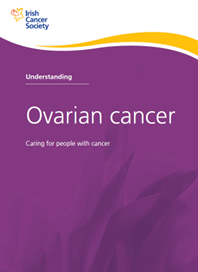Ovarian cancer
About 370* women in Ireland each year are diagnosed with ovarian cancer.
Signs and symptoms
Learn about the signs and symptoms of ovarian cancer. You are more likely to survive cancer if you find it at an earlier stage.
Treatments
There are a number of different treatments available for ovarian cancer. Your medical team will explain the best treatment options for you.
What is ovarian cancer?
Ovarian cancer is when the normal cells in the ovary change and grow to form a tumour.
Because the ovaries are deep in the pelvis, if the tumour gets bigger it may affect nearby organs. This can include the bladder or the bowel. This in turn can lead to symptoms.
Ovarian cancer is one of the more common cancers in women. Each year about 370 women are diagnosed with it in Ireland.*
What are the ovaries and what do they do?
The ovaries are part of the female reproductive system. They are two small oval-shaped organs on each side of your womb in your lower abdomen (pelvis).
Each month, if you are fertile, an egg is made in one of your ovaries. The egg leaves your ovary and passes down a tube called the fallopian tube to your womb. If the egg is not fertilised by sperm, it leaves your womb with the lining of the womb. This happens as part of a monthly cycle known as a period (menstruation). The ovaries make the female sex hormones, oestrogen and progesterone, which control your periods.
You are fertile from the age when periods starts (puberty) to when they stop (menopause). During the menopause less hormones are made, so periods gradually stop.
We use gender-inclusive language. We sometimes use woman/man and female/male when they are needed to explain a person's treatment and care - for example, talking about hormones or body parts - and when needed to describe research or statistics.
Risks and prevention of ovarian cancer
The cause of ovarian cancer is unknown. But there are certain things called risk factors that can increase your chance of developing the disease.
These include:
- Reproductive history: If you have no children or have your first child after the age of 35, your risk is higher. Breastfeeding may lower the risk of developing ovarian cancer. Taking the oral contraceptive pill may also reduce the risk. Research has shown that the longer you take the pill, the more your risk is thought to come down.
- Age: Ovarian cancer usually affects those who have been through the menopause.
Family history of cancer: If you have two or more close relatives (mother, sister or daughter) who have had ovarian cancer or breast cancer, you may be at a higher risk of the disease. Having relatives with ovarian cancer does not necessarily mean that you have a faulty inherited gene in the family. Faulty genes can lead to ovarian cancer in a very small number of cases - about 5-10%. These include the genes BRCA1 and BRCA2. BRCA1 and BRCA2 are also linked to the development of breast cancer. There is also a very small risk of ovarian cancer if your family have the genetic mutation known as Lynch Syndrome. We have more information on genes and cancer.
Tests can now check for faulty BRCA1 or BRCA2 genes. If you are concerned about a family history of ovarian or breast cancer, visit your family doctor (GP).
Read more about cancer and genes.
- Taking HRT: If you take the hormone oestrogen for 5 or more years, your risk of ovarian cancer may be higher. This risk decreases once you stop taking it.
- Fertility treatments: Some research has shown that there is an increased risk of ovarian cancer in women who have fertility treatment. But other studies have found that this is not the case. Fertility drugs are also linked to a higher risk of ovarian cancer.
- Obesity: Several studies have shown that there may be a link between ovarian cancer and obesity.
Having a risk factor doesn’t mean you will definitely get cancer. Sometimes people with no risk factors get the disease. If you’re worried, talk to your GP or talk to one of our cancer nurses. Call our Support Line on 1800 200 700 or visit a Daffodil Centre.
Note: We use gender-inclusive language. We sometimes use woman/man and female/male when they are needed to explain a person's treatment and care - for example, talking about hormones or body parts - and when needed to describe research or statistics.
Medical content updated from our 'Understanding ovarian cancer' booklet (2023). Reviewed by Dr Claire Thompson, Consultant Gynaecological Oncologist, Emma Nixon, Gynaecological Oncology Clinical Nurse Specialist and Mary Loftus, Daffodil Centre Nurse.
For more information on ovarian cancer, you can also look at This is GO, which gives tailored information for people worried about ovarian cancer, people diagnosed with ovarian cancer and for friends and relatives. This is GO is part of the Women's Health Initiative, a research project supported by the Irish Cancer Society.
Talk to a Cancer Nurse

Support Line
Our Daffodil Centres

*The Irish Cancer Society uses the most up-to-date cancer statistics from the National Cancer Registry Ireland, available on www.ncri.ie

